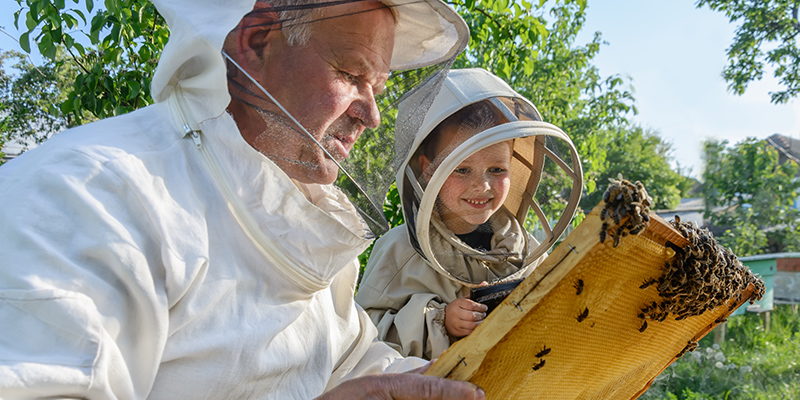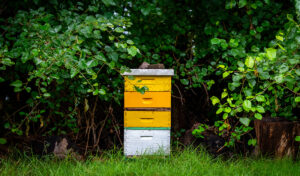Beekeeping In HOAs: Is It Allowed?

Beekeeping in HOA communities has been a hotly contested topic as of late. Many Americans are turning their homes into organic havens — growing their own produce and maintaining chicken coops. Keeping bees was a natural and logical transition. However, it may not be allowed in homeowners associations.
Browse By Category
Sign up for Our Newsletter
Beekeeping in HOA communities has been a hotly contested topic as of late. Many Americans are turning their homes into organic havens — growing their own produce and maintaining chicken coops. Keeping bees was a natural and logical transition. However, it may not be allowed in homeowners associations.
The Pros and Cons of Beekeeping in HOA Communities
Bees play a vital role in food production. They pollinate about one-third of the food we consume. Unfortunately, bees are dying out at an alarming rate, mainly because of disease, pesticides, and parasites.
There is a collective effort to restore the bee population across the country. Beekeeping is also gaining popularity, especially among homeowners who want a more organic lifestyle. In keeping bees, they can help boost the bee population, encourage pollination, and maintain a honey supply.
Beekeeping is not always permitted in homeowners associations, though. Many HOAs are concerned about the potential liability associated with it.
Of particular note are bee stings. The risk of stings from honey bees is low; most bee stings don’t threaten a person’s health. However, some residents may be allergic to bee stings, even to the point of death. Therein lies the fear among HOAs.
Can the HOA Prohibit Beekeeping?
Whether or not an HOA can prohibit beekeeping depends on state/local laws and the HOA’s governing documents.
State and Local Laws
Regarding beekeeping, some states have more relaxed laws than others. In Georgia, Section 2-14-41.1 does not allow local governments to prohibit, impede, or restrict honey bee production or maintenance. Similarly, Florida law requires people to register their honey bee colonies with the Department of Agriculture and Consumer Services. The process also involves an inspection.
While Georgia and Florida have laws that apply to honey bee production, they don’t explicitly prohibit HOAs from restricting beekeeping. Of course, that isn’t to say there haven’t been legislative efforts elsewhere.
Indiana is a prime example. Just this year, the state passed House Bill 1337, which consists of several HOA community beekeeping provisions. Beginning July 1, 2024, HOAs may regulate the number and location of beehives on properties. However, an HOA may not restrict the number and location of beehives before adopting regulations.
Additionally, an HOA may not prohibit beekeeping on a property that complies with state law if the purpose of the beehives is for pollination or honey production. However, an HOA may prohibit beekeeping within 100 feet of a property if a physician confirms that a property resident is allergic to bees and that the resident lived there before their neighbor started to keep bees.
Governing Documents
In addition to state and local laws, homeowners must also check their governing documents to determine if their community has an HOA beekeeping restriction. While state and local laws may permit beekeeping, it does not guarantee that homeowners in HOAs can do so. Unless state and local laws explicitly prevent HOAs from prohibiting or regulating beekeeping, an HOA generally does have the authority to enact beekeeping rules.
 How Can HOAs Regulate Beehives?
How Can HOAs Regulate Beehives?
Bees are crucial to the ecosystem. However, many associations wish to regulate them to avoid potential liability. Here are some steps to take when regulating beekeeping in HOA communities.
1. Amend Governing Documents
To regulate beekeeping, an HOA board must first amend its governing documents to reflect the new restrictions. This will give the HOA the authority to enforce the restrictions. Amending the CC&Rs usually takes a majority or two-thirds vote from the membership. As such, the HOA must secure votes from homeowners to pass the amendment.
Some HOAs have rules prohibiting homeowners from keeping livestock on their property. It is unclear, though, whether or not bees can fall under the same category. Therefore, it is best to amend the governing documents to regulate beekeeping specifically.
2. Regulate Home Businesses
If homeowners wish to keep bees to earn extra money — through the sale of honey or wax products — then the HOA should regulate that, too. In many associations, running a business from home is not permitted.
3. Consider Liability
Homeowners may not want bees in the community because they are afraid of bee stings. Although honey bee stings may be painful, they are relatively harmless. The pain and swelling may subside within several hours.
While honey bees rarely sting people unless provoked, the fear still exists, so it may be difficult to convince owners otherwise. Additionally, some residents may have bee or sting allergies, which can be fatal. Because of this, boards must look into the potential liability involved when regulating beekeeping in HOA communities.
4. Purchase Insurance
Insurance can help with potential liability and damages claims. However, it is important to have a lawyer review the proposed policy before agreeing to it. Some policies have far too many exclusions, rendering them useless.
Other Ways HOAs Can Help
Honey bees are essential in the food chain, but not all HOAs feel confident in allowing owners to keep them. Fortunately, there are other ways for an HOA to help the bee population.
 Relocate. If the board finds a hive or swarm within the HOA, it should contact a local beekeeper instead of pest control. Honey bees are not pests. A local beekeeper can remove the hive from the community and relocate it elsewhere. The HOA board should also encourage homeowners to do the same.
Relocate. If the board finds a hive or swarm within the HOA, it should contact a local beekeeper instead of pest control. Honey bees are not pests. A local beekeeper can remove the hive from the community and relocate it elsewhere. The HOA board should also encourage homeowners to do the same.- Plant Flowers. Associations can help bee populations flourish by planting flowering plants in common areas. Homeowners can follow suit and plant them in their yards, too. Bees rely on flowers for nectar and pollen. Providing them with a pesticide-free source of energy will help boost their propagation.
- Support Local Beekeepers. If an HOA can’t allow beekeeping in its community, the next best thing is to support local beekeepers. The HOA can encourage homeowners to buy local honey and wax products to do this. Buying local products is not only healthier because they are more natural, but it also gives beekeepers a steady income stream.
The Final Word on Beekeeping in HOA Communities
Bees are tiny insects that make giant contributions. While allowing beekeeping in HOAs can help boost their population, it also comes with liability concerns. Ultimately, the decision on whether or not to permit beekeeping rests in the HOA’s hands.
Are you looking for a reliable HOA management company in your area? Start browsing our online directory today!
RELATED ARTICLES:
- Emotional Support Animals In HOAs: Allowed Or Not?
- What Is America’s Buggiest States?
- Should Smoking Marijuana In HOA Communities Be Allowed?
Trending Now
Related Article
Sign up for Our Monthly Newsletter
Sign up below for monthly updates on all HOA Resource














